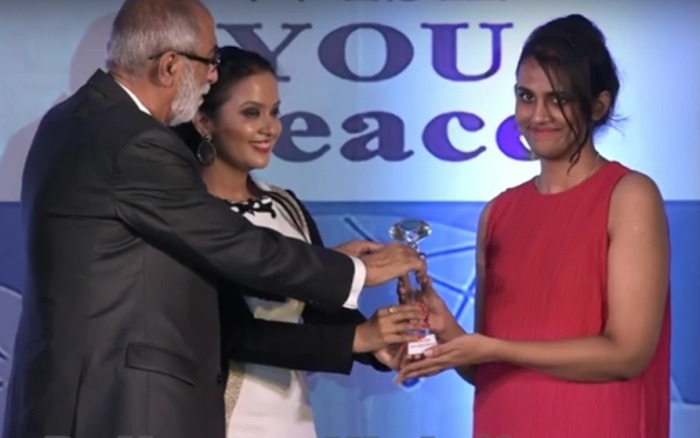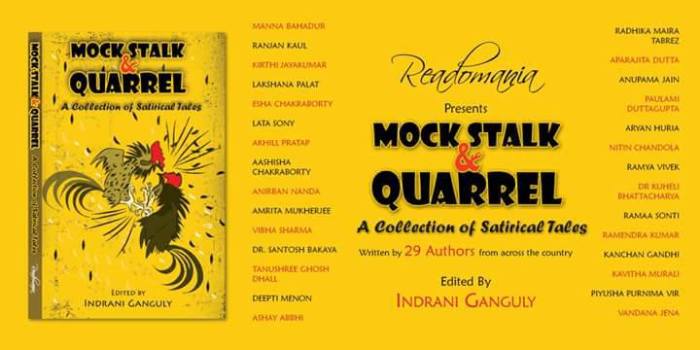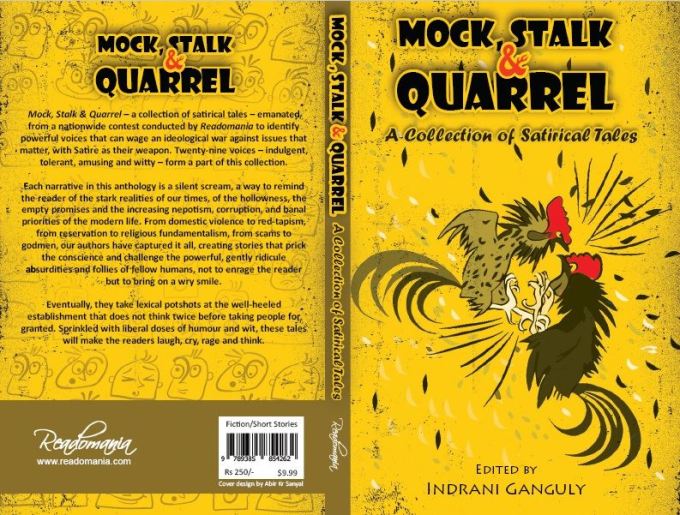Hello People! Enjoying weekend?
This post is something unique and special. Unique because this is one of a kind at “Smiles here and smiles there”, and special because this contains the life work and thoughts of someone authentic.
This is an interview post with Ms. Kirthi Jayakumar. She is an Indian women’s rights activist, artist, lawyer, and writer. Talking to her and knowing more about her has made me think of with different phases of life.
Below is the discussion we shared and I hope we all can learn how to MAKE-IT-BIG and follow our heart desires.
Darshith: Please tell something about yourself.
Kirthi: I am a very ordinary person, with big dreams and ambitions. I was born in Bangalore and grew up between Bangalore and Chennai. I did my Bachelor’s degree in Law and Masters’ Degree in Peace and Conflict Studies. I’ve been working in the development and humanitarian domain for six years now, and it’s been a moving journey so far. I enjoy writing – and it still surprises me that I have had the good fortune of being published twice solo in fiction, thrice as an anthology contributor (Mock Stalk and Quarrel being the fourth) and thrice solo in non-fiction. I want to be able to write more, and hope to, in the coming few months / years. I enjoy doodling, something that was born out of defiance in a Labour Law class when the professor was being unreasonable and incomprehensible – and that’s led me onto some interesting opportunities to respond to commissioned art requests and training workshops. I founded and run The Red Elephant Foundation, which works for civilian peace building and gender equality through storytelling.
Darshith: Which incident or inner feeling made you write on such an unique genre of satire?
Kirthi: In my writing, I find myself drawn towards the core issue that defines my work at the Red Elephant Foundation and in the development space – gender equality. The piece I wrote as part of Mock Stalk and Quarrel is a satirical take on the situation that women face in India. The first element in playing with satire in the story is the reworking of the age old epistolary model – I twisted it into a contemporary space, parodying the dying art of mindful communication with technology forcing brevity. So the entire story is a conversation taking place in the form of a WhatsApp Conversation. The second twist is the irony underlying the conversations around gender in India. Women are revered in their form as goddesses, but are subject to mindless violence in their form as human beings. So the entire story is a conversation taking place in the form of a WhatsApp Conversation between Goddesses Lakshmi, Saraswati and Parvati – on GodsApp. The third twist is the story itself – which I will not go into, in the interest of allowing it to be a reader’s experience. So in that sense, I guess it was really all that I internalize in and from the world around me that made it into a story.
Darshith: Who all have been an inspiration in this journey of yours?
Kirthi: A lot of people, truly. But I’ll keep this short and say that Ashay Abbhi (for his unconditional support, faith in me and encouragement), Deepti Menon (for always buoying my spirits and encouraging me), my friend Sashankh Kale (for his kindness, and our endless conversations around Parks & Rec, 30 Rock and Mindy Kaling) and Dipankar Mukherjee (for the encouragement and the real estate he gives my thoughts through Readomania) really made this leg of the journey happen for me. Had it not been for their inspiration, their wit and the intelligent conversations, I may not have found reason to put pen to paper.
Darshith: What made you choose this life of a writer and a philanthropist?
Kirthi: Writing defines everything I do – whether it is the work I do for a living or The Red Elephant Foundation or even the zen doodling side of things – I am essentially looking for and verbalizing stories. So I think it was the most natural thing for me to do. To be honest, I doubt I would have been able to do anything else, and I don’t quite think I have the brains or skill for much else. Responding to the second part of your question, well, I don’t see myself as a philanthropist, since I don’t operate from a place of charity. I see myself as more of a global citizen who has identified a problem that she doesn’t want to be a part of, and is working to be part of a solution.
Darshith: You are the founder of “Red Elephant Foundation” and shared the important idea behind it’s working. So, what led to beginning of “Red Elephant Foundation” and why such an unique name?
Kirthi: The choice of the name was really to drive home one message. Red is a colour you don’t forget. Elephants are animals that have phenomenal memory. This combination seemed fitting for our stories because they were stories we wanted people to never forget. By and by, we learned that elephants are a matriarchal community / species, and that really drove home a beautiful validation since we stand for gender equality. We also learned – even if it was only a definition from urban dictionary – that people have considered the red elephant to mean someone who stands up to the elephant in the room.
Darshith: Can you share some of the hurdles which you faced while building “Red Elephant Foundation”?
Kirthi: In any field of work, you have both, receptiveness and resistance. However, sometimes, you find the resistance is so strong, and the receptiveness doesn’t always turn into a payforward, that it seems like the resistance is gaining greater ground. From our work, I can safely say that we’ve had both, receptiveness and rejection, and have, TOUCHWOOD, been blessed to have turned the resistance into receptiveness through education. But in the greater landscape is fraught with a lot of obstacles. I think society can make a turn around if all the influences on society honestly dovetail into the same message of gender equality. It is not enough for organizations to work with the youth and their parents and address issues like consent and sexual violence and personal boundaries, if pop culture is going to normalize the objectification and stalking of women. This, again, can come only if we collaborate. My greatest grief comes from the competitive nature of organisations working in this domain. We are not in competition, we can make a difference only if we collaborate.
Darshith: Why do you think Satire is important? What is your approach to writing it?
Kirthi: I’ll be honest and tell you that my style of writing – and both of my solo books will testify to it – involves telling stark stories with human emotions. It is about making people and emotions come alive in every part of what you otherwise see as statistics in a media report. I write extensively about war, social evils and dangerous predicaments that pose threats to human rights in all of its intersectional existence. So for me, Satire is a new genre of writing. That said, I now see it is incredibly important because it helps me (a) write out a piece from a place of passion but tell it in a way that the other might like to read – no one wants gloom and doom, but if gloom and doom dresses in satire, it’s more welcome, and (b) it’s also a very insightful way to try to keep things lighter in the manner of one’s telling of a grim truth. My approach has been rather wet around the ears given that I was trying satire on for size. I’m waiting to see what our readers make of my attempt before I can tell you whether it fit or not 🙂
Darshith: If you be satirical in your approach to others then sometimes you may be on the receiving end of it. How do you tackle it?
Kirthi: I like to look at it as choice and consequence, and the circular theory of you get what you give. I’m not always prepared to receive it, but I definitely try and shift my own mindset.
Darshith: Any future pipeline work of yours?
Kirthi: A lot of work sits in the pipeline, yes! I’m looking at a lot of themes and writing them down – I’ll let them play out and circle back to you when I something worthy to write home about. Otherwise, it’s just a lot of smoke in the air!
Darshith: What is the future of short stories? Which do you prefer – short stories or full-length novels?
Kirthi: I think short stories will always have a place in the world of literature. In the world of mass consumption, between Terribly Tiny Tales and enormous pillow-like-tomes, short stories work well for anyone. As a reader, I want good literature, so it doesn’t matter if it is a short story or a novel or a poem dancing in a tea cosy so far as I’m concerned. As a writer, I find that I write short stories better and quicker and tend to make more sense with short stories than a full length novel. The dream is to write a full length novel, though.
Darshith: Your’s & my sister’s b’day is on the same date so any thoughts about December born babies? 😀
Kirthi: That’s lovely! Happy Birthday to your sister! I guess everyone has a little special something attached to their birth days / months – but I’d say that being a December-born, going by all those chronicles of sun-sign-characteristics, it is true that I live life with fire in my belly and an unshakeable sense of love and devotion to a very select few. If I’ve defined and identified something I’m passionate about, and if I’ve identified a person as someone who matters to me, I am extremely intense in my dedication to it / them, and am uninhibited about walking to the moon and back for it / them. 🙂

Darshith: How does it feel to give something back to the society where we are all born and brought up?
Kirthi: I’ll be really honest and say that I don’t feel like I am giving back yet. I feel like there is a lot, lot, lot more to do, and our efforts in denting the reality will take some time. BUT, the process of doing it feels right – almost like the most natural thing, ever.
Darshith: What are your thoughts about “Writer’s block”? Have you been there? How do you get yourself out of it?
Kirthi: Plenty of times 🙂 I don’t look at it as a negative thing or something I should be worried about or something I should get out of. I use it as time to do a lot of other things – doodling / sketching, working on REF, reading, watching / listening to Kenny Sebastian’s / Superwoman / Aditi Mittal’s comedy sketches, overdosing on Sia’s Cheap Thrills, imagining myself in Hogwarts and fighting the dementors (my patronus is a phoenix in a panda’s coat, by the way) and eating.
Not all people love their work and follow their inner desire and here’s to one of the few. She’s received several awards like United States Presidential Service Award from President Barack Obama in 2011-2012. She is also the recipient of two United Nations Online Volunteering Awards in 2012[2] and 2013 for her work with Delta Women and the Association for African Entrepreneurs. And she also received Global Peace Award from the One Life Foundation / Welingkar Institute in Mumbai this week.


“Mock, Stalk & Quarrel” is a collection of 29 satirical stories, penned by prolific writers and bestselling authors, that attempt to mock, question, defy, and raise a voice against issues that matter. The stories were chosen from a nationwide contest conducted by Readomania and compiled in this collection that promises to be an engaging and thought-provoking read. For more about the book and the authors, head to the Facebook page of Mock, Stalk & Quarrel
To get your hands on this very special collection of short stories, head to -> http://amzn.in/7AQZ2VW


Hoping for great success and many more enlightening works and inspiration from Kirthi. Once the TEDx video is publicly released, I will add it to the comment section, so folks, stay in touch and till then take care ❤